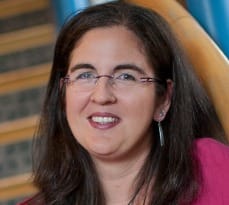Could women-only programmes be the solution to getting more women to set up businesses in the high-growth tech sectors? Dr Shima Barakat, who specialises in research in the teaching of entrepreneurship at Cambridge Judge Business School, thinks so. But it comes with a warning.
“This definitely isn’t about trying to make women into better men,” she says. “It’s important to understand that there is a place for women-only programmes – offering the environment for women to do and say things that they may not feel comfortable doing and saying in a mixed-environment – but that such programmes should be seen in the wider context. There is certainly a place for women-only programmes such as EnterpriseWISE, but it should be just one aspect of management among a wider portfolio of training and development.”

EnterpriseWISE is a tailored entrepreneurship programme that has been created for PhD and early career women working in the fields of science, engineering and technology with the express purpose of developing skills, knowledge and confidence. And in focusing on the programme, Dr Barakat’s research suggests an increase in what she terms entrepreneurial self-efficacy (ESE) among women who attended.
“The most significant implication of our work is probably the evidence it offers that there may be value in funding and delivering women-only, in addition to co-educational, programmes; not because women learn better in a women-only environment, but to combat certain cultural and organisational phenomena and respond to widening access to enterprise and entrepreneurship education.”
Women in science and engineering are perceived as tokenistic, explains Dr Barakat. “The same goes for women in entrepreneurship. So if you’re a female entrepreneur in a STEM (science, technology, engineering and maths) subject, you’re a double token and that creates a particular dynamic in learning environments which seems to involve women either trying really hard to step away from the stereotype in order to get on with the majority or magnifying their differences, both of which are artificial behaviours. When men aren’t around, those behaviours are minimised and women operate and communicate differently – and ultimately do better.”
Indeed the Entrepreneurship Centre at Cambridge Judge is currently running the BioBeat initiative (in partnership with Miranda Weston-Smith, a biotech business consultant), recognising the fact that “women adopt different strategies for success – from different ways of building companies, working in teams and communication to raising funds and attitudes to risk – and that understanding these success factors offers opportunities to develop business models that more effectively engage talent in broader, more inclusive and more dynamic ways.” The aim is to showcase women leaders in the sector, what they bring and how different ways of working (and how women work) can bring fresh ideas, thinking and energy to organisations in a sector in challenging economic times.
But there is also the question of challenging attitudes, motivations and misconceptions at a much earlier stage. Dr Enass Abo-Hamed, research associate at the University of Cambridge and CSO and acting CEO at H2GO Power, attended the EnterpriseWISE programme in 2012, and suggests women should be reached even earlier in their education, ideally making programmes in entrepreneurship compulsory in STEM subjects at undergraduate level. “This is the time when women are really enthused about the STEM subject they have chosen, so let’s use the opportunity to get them enthused about the idea of start-ups too,” she says.
Meanwhile, Dr Chih-Chun Chen, co-founder of Cambridge Coding Academy, thinks that if we really want more female entrepreneurs in high-growth tech sectors we need to rethink the entire way STEM subjects are taught. “Even when I did my conversion masters in computer science, less than a quarter of the class were women and most of them didn’t thrive in the subject. I have since learned that this is not unusual – a fact that I think is at least in part due to the way the subject is taught. It’s just not framed in a way that seems to interest women. I happened to love it and went on to do a PhD, but I was in the minority.”
Indeed, Dr Chen believes that it is a problem that goes right back to school. “I’m very interested in how these subjects are perceived by children in different countries. In Taiwan, for example, it’s as expected for girls to be good at maths or computer science as it is for boys, but in the UK, the expectation and encouragement from peers, family and even schools seems to be lower. I think the STEM subjects are often seen as ‘masculine’ or ‘cold’ subjects, even if only at a subconscious level. The same thing seems to happen with boys and more ‘arty’ subjects like English, which are seen as ‘girly’, perpetuating this idea that some subjects are gender-specific. The stats for university applications and intake also support this.”
While the women did better in the entrepreneurship part of her masters degree, Dr Chen couldn’t help but notice that they tended to be more risk-averse, less impulsive and more afraid of failure than the men. “Several women considering becoming entrepreneurs have said to me that they wish someone was there to reassure them that their idea is worthy, whereas I rarely hear this from men, and I can’t help feeling that affects the number of start-ups by women,” she says, pointing out that the research backs her up.
It’s for this very reason that Dr Liisa Van Vliet, research associate in the University of Cambridge’s Department of Biochemistry, believes role models and mentors have a big part to play. “I’m trying to set something up in my old college that would involve undergraduates working with alumni in this way. We have quite a list of STEM entrepreneurs and I want to see more of them come and give talks to motivate people, and possibly continue in a mentoring role. I have one woman mentor that I pass everything by and, for me, that sounding board has been great.”
Dr Tanya Hutter, director and co-founder of SensorHut, suggests another way. “I’d like to see more women-only grants – small ones, perhaps, of around £5,000 – that can be enough to start up a whole business and make women, who we know take fewer risks, less scared about it. Better still, the small amount of money would be combined with training. I really think it could make a big difference.”
Efforts are also needed around increasing women’s self-esteem, believes Dr Hutter. “Once you go out into the business world, particularly when it comes to the hi-growth tech sector, every event is male-dominated and that could potentially be intimidating for some women. The stereotype that women belong in HR and men in science seems to prevail.”
This kind of pigeonholing isn’t necessarily overt or even planned, believes Dr Barakat. “It’s just that, as my own research has shown, the natural gatekeepers of STEM have a tendency, as we all do, to gravitate towards people like themselves. To change that, you need to disrupt the structures of homophily.”
Ultimately Dr Barakat is focused on the end result. “We want to support more women as they transition from the world of STEM into business,” she says. “At the moment the numbers aren’t high, and those that do make it are the ones behaving most like men. This isn’t about women being deficient, it’s about targeting specific programmes to help broaden the pool.”


